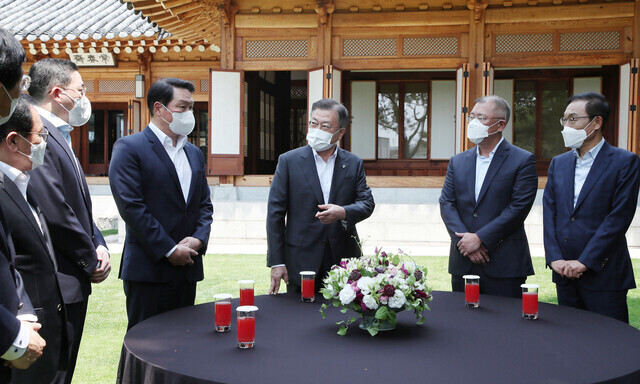hankyoreh
Links to other country sites 다른 나라 사이트 링크
S. Korea ranks ninth out of 12 countries examined for corporate governance, report shows

South Korean companies are having a tough time shedding their image of lagging far behind when it comes to their governance structures. They tend to rate very poorly even in international comparisons that are restricted to Asian countries.
It’s a situation that bears some connections with routine violations of the rules, including the funneling of work to affiliates and questionable tactics to pave the way for later generations to inherit the management reins.
Is there a possibility that this backward situation might now be improving?
On Sunday, the Federation of Korean Industries released findings from an analysis of corporate governance structure reports from 175 non-financial companies. The results showed an average adoption rate of 64.6% for 15 total indicators as of 2020.
The rate was up from 52.9% from an analysis in 2018 (161 companies), the year that mandatory publication of corporate governance structure reports was first instituted, and from 58.6% in a 2019 analysis (171 companies). This suggests that gradual improvements have been made over the past three years.
Corporate governance structure reports consist of 15 indicators where companies announce their adoption of key principles related to corporate governance structure as designated by the Korea Exchange. They are mandatory for listed corporations with total assets of 2 trillion won (US$1.76 billion) or more.
The latest survey showed a particularly large rise in the indicator on “adoption of electronic voting in articles of association,” which jumped all the way from 25.5% in 2018 to 72.0% as of 2020.
Other indicators that showed high adoption rates last year included “introduction of procedures for internal auditing organizations to access important management-related information” (100%), “one or more educational sessions per year for internal auditing organizations” (97.1%), “presence of accounting or financial experts in internal auditing organizations” (94.9%), “no outside [non-executive] directors serving for over six years” (92.6%), and “establishment and operation of internal control policies” (88.0%).
The adoption rate for the “introduction of cumulative voting” indicator remained the lowest for three straight years: 5.6% in 2018, 5.3% in 2019, and 5.1% in 2020. The rate was far below the average adoption rate for all 15 indicators.
A total of nine companies adopted such a system over the three-year period: the Korea Electric Power Corporation, the Korea Gas Corporation, the Korea District Heating Corporation, Kangwon Land, Daewoo Shipbuilding & Marine Engineering, POSCO, KT, KT&G, and SK Telecom.
Cumulative voting is a system in which shareholders are given voting rights equivalent to their number of shares multiplied by however many new directors are being chosen when a company elects two or more directors, rather than the equivalent of one vote per share. This allows them to back a single candidate with multiple votes.
It was first introduced in 1998 with an amendment of the Commercial Act, although it is not mandatory and companies are entitled to sidestep it through their articles of association. Mandatory option on a phased basis was originally discussed at the time of the enactment and amendment of three “fair economy laws” last year, but it ended up being left out.
Last month, the Economic Reform Research Institute shared the findings of an Asian Corporate Governance Association assessment of corporate governance structures in 2020. The results showed South Korea ranking ninth out of 12 countries examined, with a total score of 52.9 out of 100 points.
South Korea slipped from sixth to ninth place between 2007 and 2010 and has remained in the eighth to ninth range ever since.
Low ratings for South Korea last year came mainly in the three categories of “corporate governance rules” (10th), “listed companies” (10th), and “civil society and media” (10th).
By Kim Young-bae, senior staff writer
Please direct comments or questions to [english@hani.co.kr]

Editorial・opinion
![[Editorial] Penalties for airing allegations against Korea’s first lady endanger free press [Editorial] Penalties for airing allegations against Korea’s first lady endanger free press](https://flexible.img.hani.co.kr/flexible/normal/500/300/imgdb/original/2024/0502/1817146398095106.jpg) [Editorial] Penalties for airing allegations against Korea’s first lady endanger free press
[Editorial] Penalties for airing allegations against Korea’s first lady endanger free press![[Editorial] Yoon must halt procurement of SM-3 interceptor missiles [Editorial] Yoon must halt procurement of SM-3 interceptor missiles](https://flexible.img.hani.co.kr/flexible/normal/500/300/imgdb/child/2024/0501/17145495551605_1717145495195344.jpg) [Editorial] Yoon must halt procurement of SM-3 interceptor missiles
[Editorial] Yoon must halt procurement of SM-3 interceptor missiles- [Guest essay] Maybe Korea’s rapid population decline is an opportunity, not a crisis
- [Column] Can Yoon steer diplomacy with Russia, China back on track?
- [Column] Season 2 of special prosecutor probe may be coming to Korea soon
- [Column] Park Geun-hye déjà vu in Yoon Suk-yeol
- [Editorial] New weight of N. Korea’s nuclear threats makes dialogue all the more urgent
- [Guest essay] The real reason Korea’s new right wants to dub Rhee a founding father
- [Column] ‘Choson’: Is it time we start referring to N. Korea in its own terms?
- [Editorial] Japan’s rewriting of history with Korea has gone too far
Most viewed articles
- 160% of young Koreans see no need to have kids after marriage
- 2Months and months of overdue wages are pushing migrant workers in Korea into debt
- 3[Editorial] Penalties for airing allegations against Korea’s first lady endanger free press
- 4[Reporter’s notebook] In Min’s world, she’s the artist — and NewJeans is her art
- 51 in 3 S. Korean security experts support nuclear armament, CSIS finds
- 6Bills for Itaewon crush inquiry, special counsel probe into Marine’s death pass National Assembly
- 7[Guest essay] Maybe Korea’s rapid population decline is an opportunity, not a crisis
- 8Cracks found in containment building of UAE nuclear power plant built by S. Korean companies
- 9S. Korea discusses participation in defense development with AUKUS alliance
- 10[Special report- Part I] Worked to death at the ripe age of 22